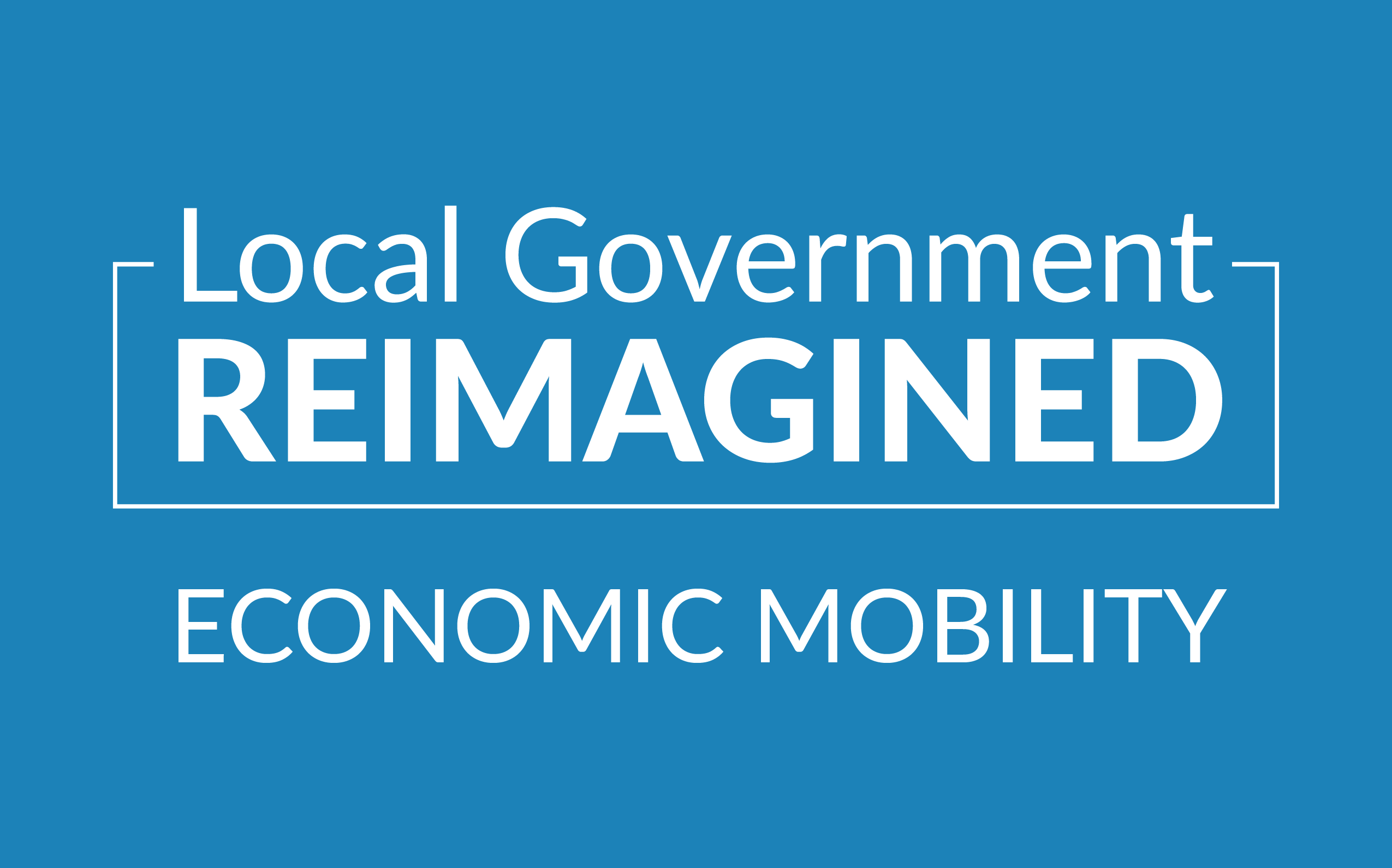
What is your local government doing to promote economic mobility? Based on ICMA’s 2024 Economic Mobility and Opportunity (EMO) Survey, the answer is probably “more than you think.” Of the more than 400 local government decision makers surveyed, 85 percent of respondents reported that their local government had not implemented any policies, programs, or performance measures to enhance economic mobility for residents. However, when asked about their work in certain policy areas related to positive economic mobility outcomes, most respondents reported that their local government had implemented at least one strategy, if not more.
Economic mobility refers to the ability of individuals and generations to move up the economic ladder over time, a concept often explained colloquially as “doing better than your parents.” While economic mobility is frequently associated with income, several factors can influence an individual’s economic mobility outcome.
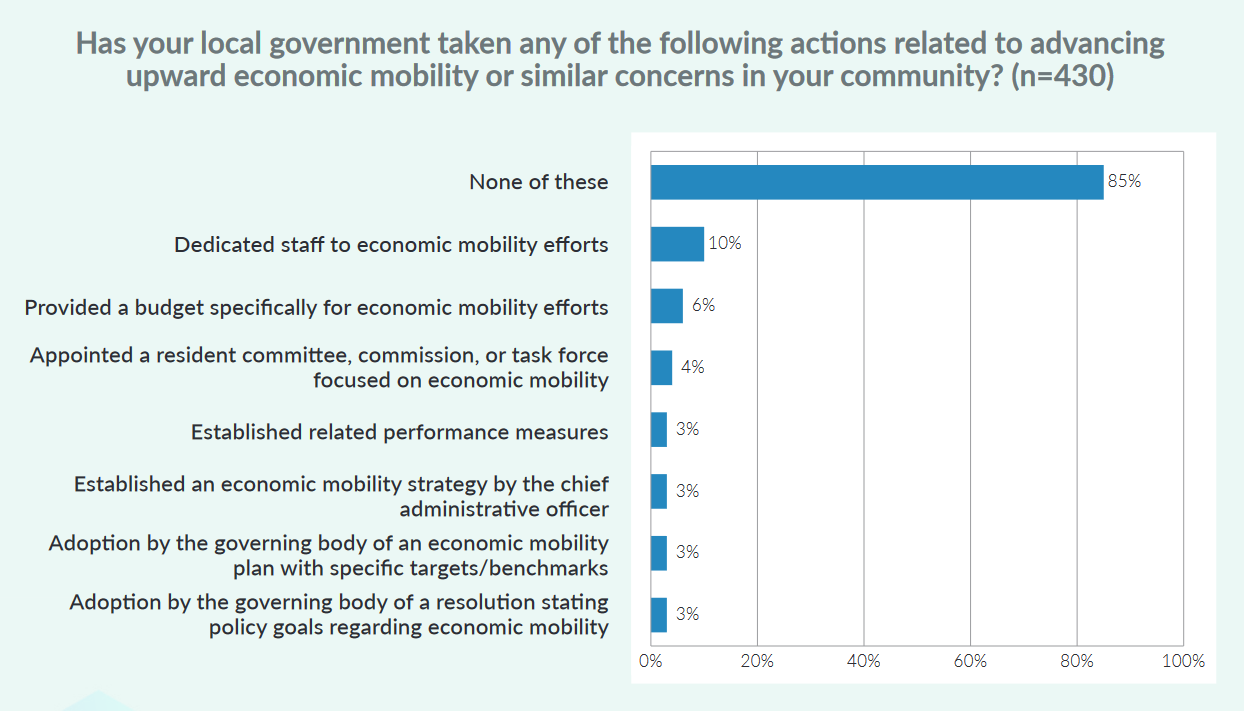
Over the past year ICMA, with the support of the Bill & Melinda Gates Foundation’s Economic Mobility and Opportunity program, has provided funding, training, and information resources to help local government leaders explore opportunities to boost upward economic mobility for their residents. To benchmark the state of practice and inform future ICMA programming, a survey was conducted in early 2024 to understand how local government decision makers currently influence key drivers of economic mobility. While the primary intention of the survey was to identify opportunities for ICMA to build economic mobility capacity among local governments, the results of the survey also provide insights into economic mobility practices in U.S. local governments, including levels of awareness, application of policies and practices, and barriers to implementation.
For this survey, ICMA asked participants about policies and programs specific to three areas known to impact economic mobility: affordable housing, workforce development, and equitable access to community services. While strategy implementation was most often cited in the areas of affordable housing (81 percent) and workforce development (81 percent), 67 percent of respondents also reported engaging in strategies to promote equitable access to community services. The most common strategy implemented to improve access to affordable housing was the implementation of policies or programs, such as zoning changes, to encourage an increase in housing density and/or the development of new housing units. Housing market analyses and programs to address vacant or abandoned properties were also commonly cited.
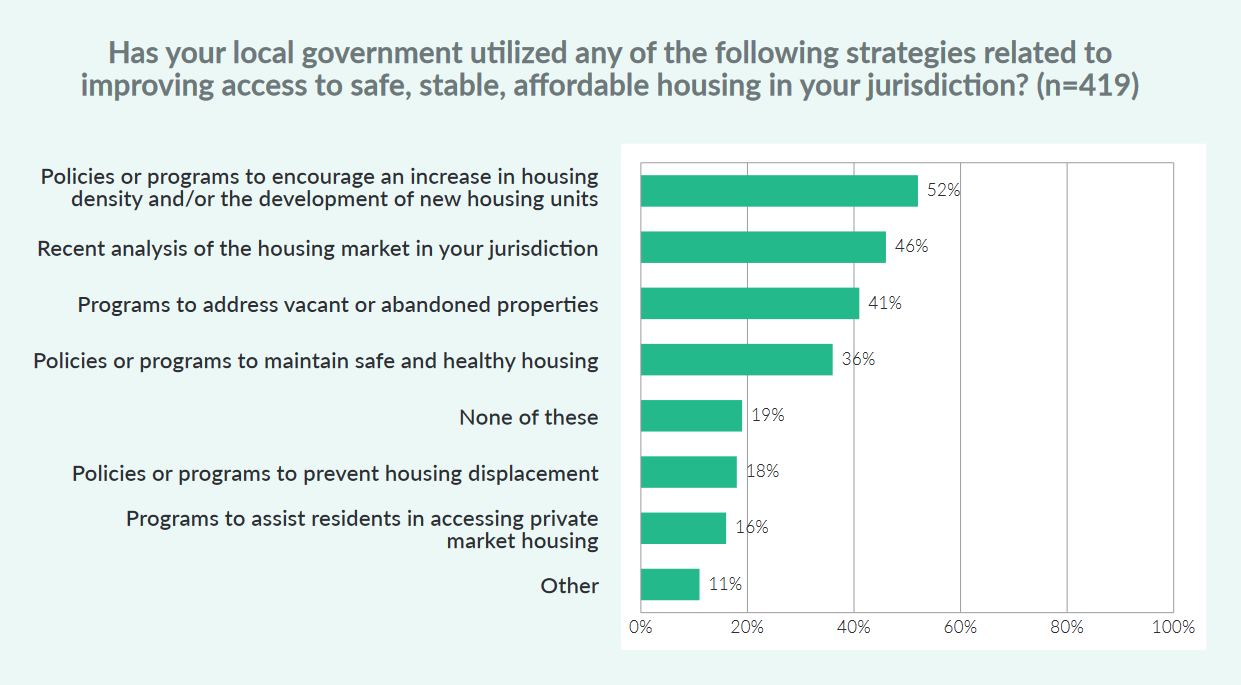
Engaging in partnerships with external entities to connect residents with employment training opportunities was the strategy local governments most often reported implementing to support economic and workforce development among respondents. Other popular strategies included the establishment of entities supporting economic development within a designated area, such as Business Improvement Districts or Community Development Corporations, and programs to create pathways into local government careers.
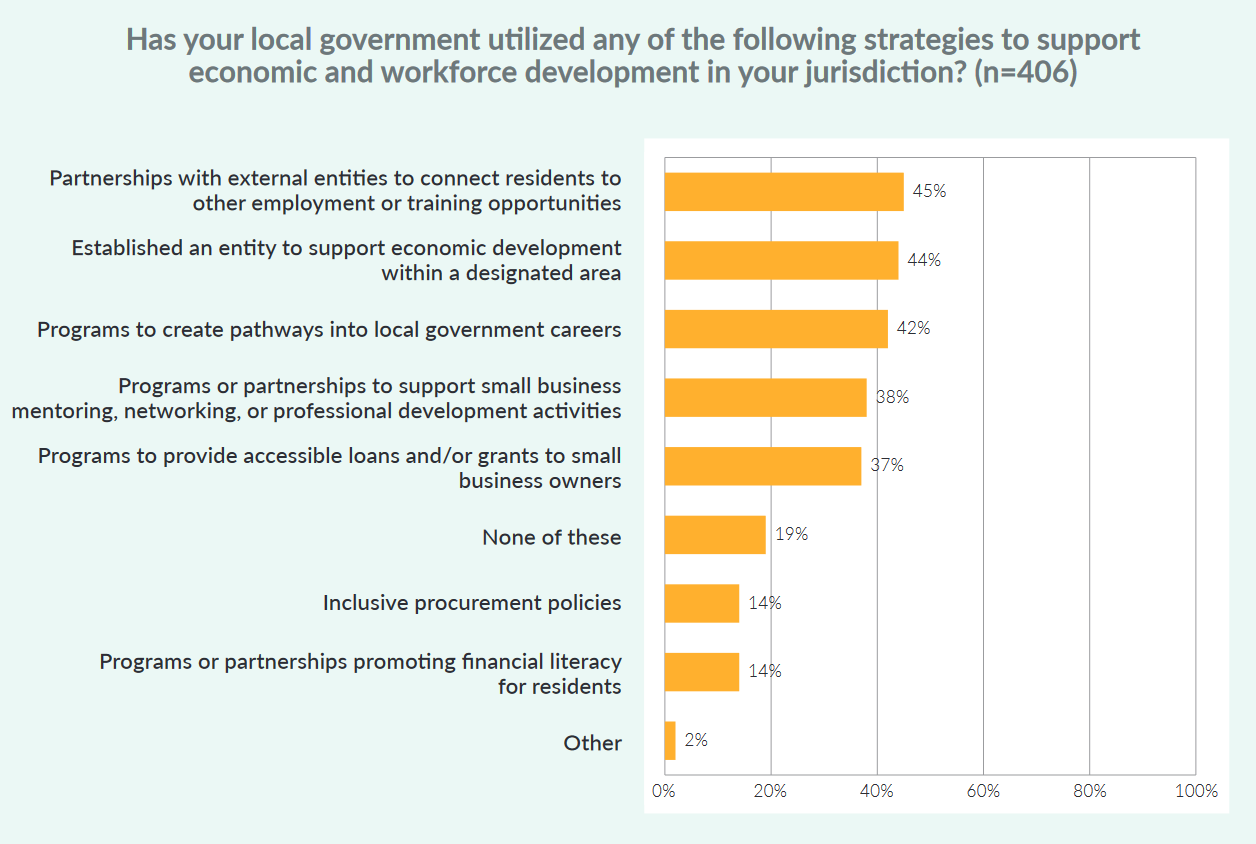
Strategies to promote equitable access to community services were less commonly reported among local governments, compared to the implementation of affordable housing or economic and workforce development strategies. However, just over a third of respondents reported implementing programs or partnerships to improve access to safe, efficient, and reliable public transportation options. Programs or partnerships to extend broadband access for all residents were adopted at similar rates.
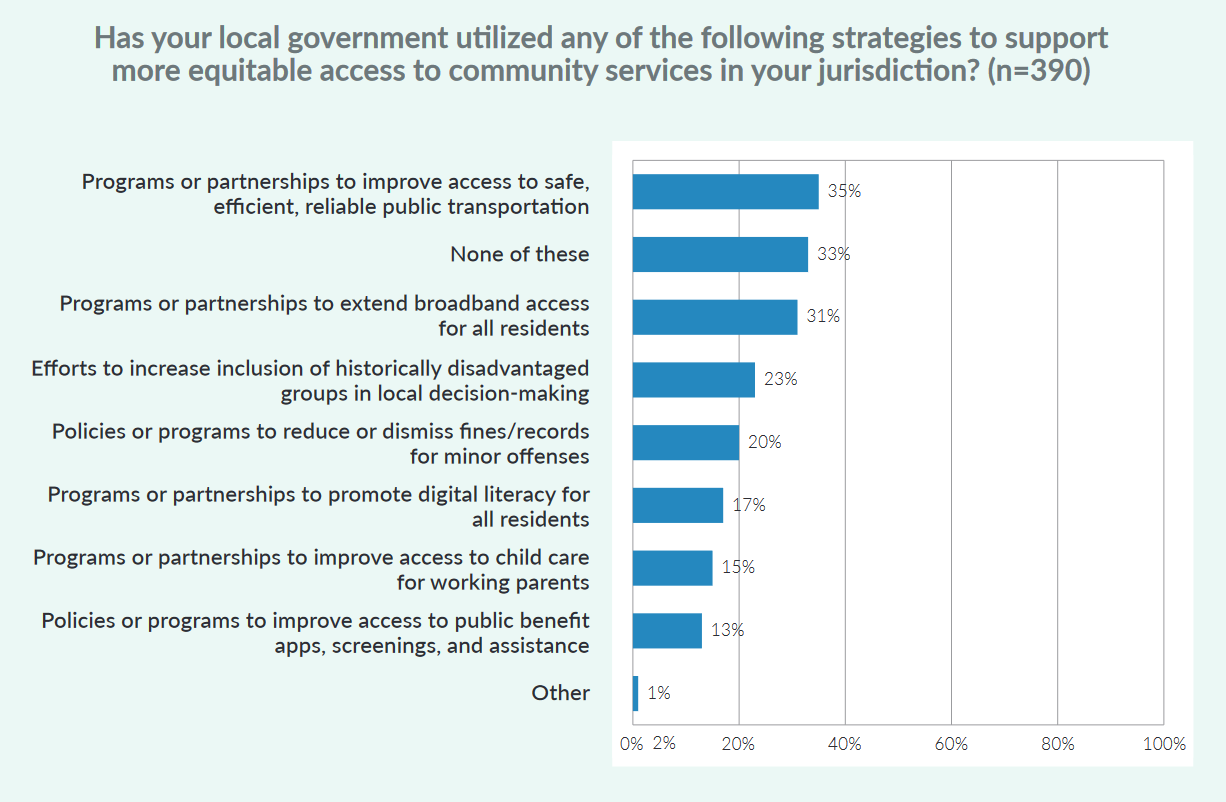
Based on survey results, it appears that most local governments are engaging in activities to enhance economic mobility for residents, though not necessarily with the specific intention of doing so. This is particularly interesting because, while several respondents said they found economic mobility activities to be inaccessible to smaller governments and/or felt that economic mobility was primarily a concern for larger municipalities, 80 percent of survey respondents were from local governments with populations of 10,000 or less.
However, while it is promising that the majority of respondents are involved in some sort of work influencing upward economic mobility, there is still room for increased engagement and the implementation of programs and policies that explicitly target economic mobility concerns. When asked about barriers to further action to address economic mobility among residents, a lack of availability of sustainable program funding was the most cited challenge, with over half (60 percent) of respondents identifying this as an issue faced by their local government. Just under half (48 percent) of respondents reported a lack of resources and skills for data gathering and analysis as a barrier. One potential method to promote further local government participation in economic mobility activities is to increase access to technical assistance programs and grant funding. Ensuring that local governments are aware of funding opportunities for long-term economic mobility efforts and planning is another possible solution.
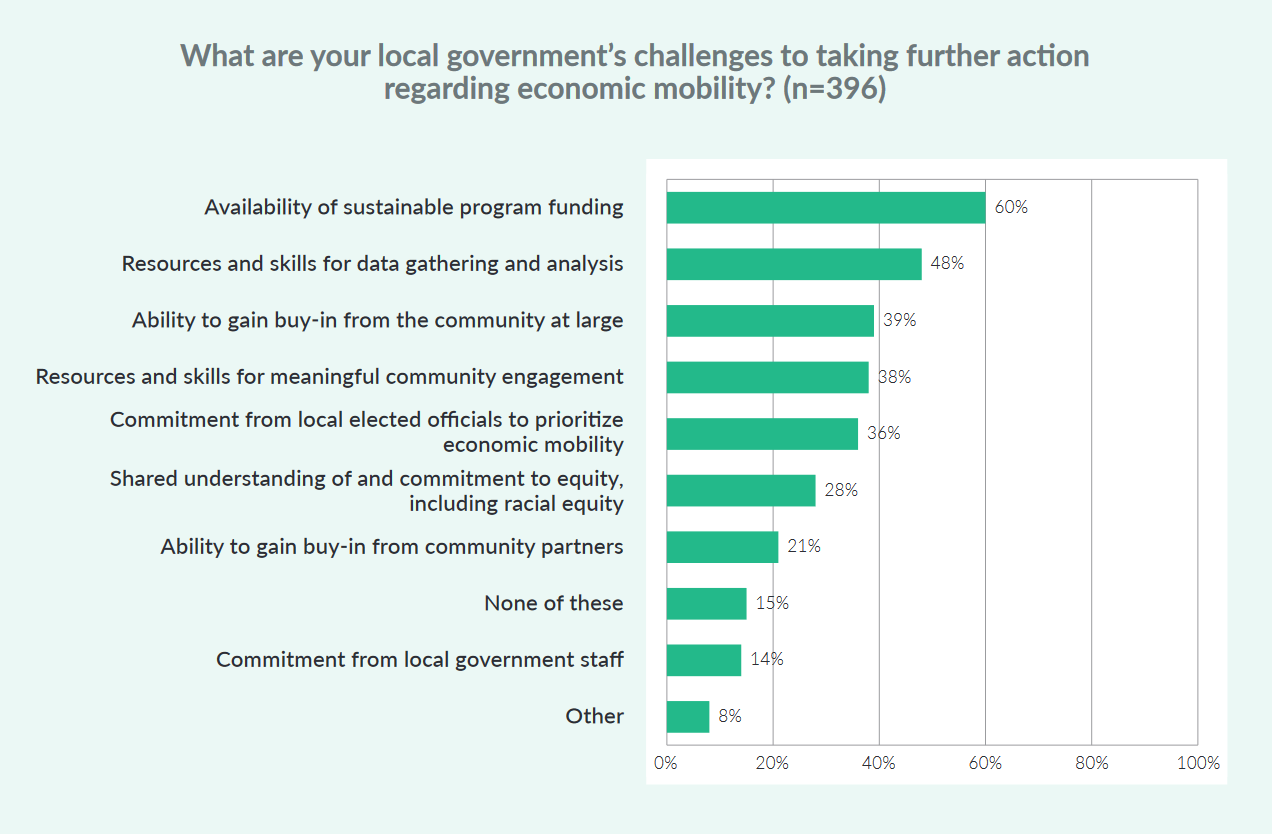
To build internal capacity and develop a plan for economic mobility without utilizing additional funding, local governments may also benefit from accessing freely available economic mobility tools and resources. While survey results showed some awareness of these types of tools among local government decision makers, the overall familiarity and utilization of such resources was limited. To make economic mobility resources more accessible, ICMA has created a one-stop Tools & Resources web page.
Overall, the current state of economic mobility work among local governments is promising, with most responding local governments participating in at least one policy or program in an area known to support upward economic mobility. However, there remains exciting potential for an increase in intentional engagement with work explicitly tied to promoting upward economic mobility. Addressing common barriers such as a lack of sustainable funding and insufficient skills and resources for data collection will allow local governments to take further action to promote upward economic mobility among their residents.
As part of ICMA’s continued partnership with the Bill & Melinda Gates Foundation, and to build on practices and needs identified through this survey, we will be rolling out additional virtual and in-person educational offerings, information resources, and other opportunities to access peer learning, microgrants, and technical assistance. Visit icma.org/emo for more information about past and upcoming activities.
Bailey Barnett, MPA, is a senior program manager for research at ICMA.
New, Reduced Membership Dues
A new, reduced dues rate is available for CAOs/ACAOs, along with additional discounts for those in smaller communities, has been implemented. Learn more and be sure to join or renew today!
